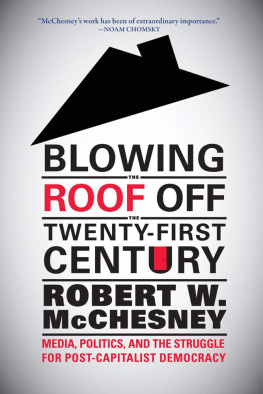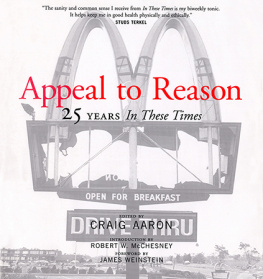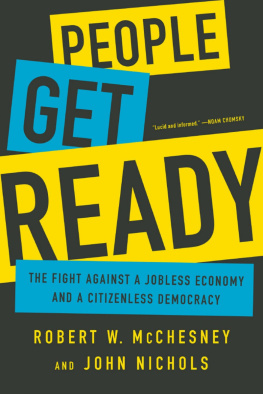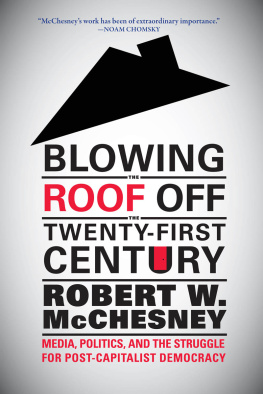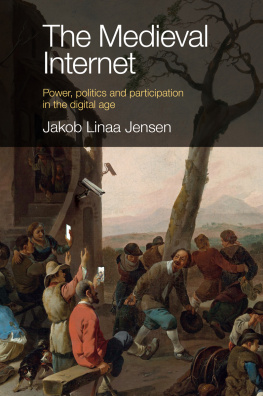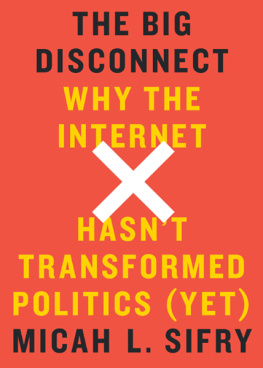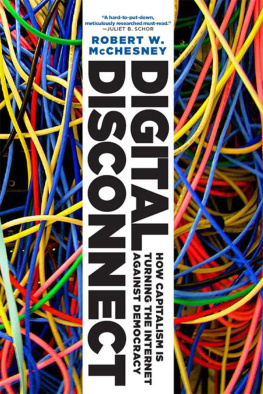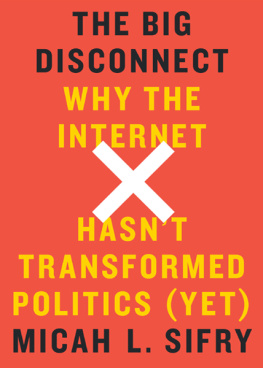DIGITAL DISCONNECT
ALSO BY ROBERT W. MCCHESNEY
Dollarocracy (with John Nichols)
The Endless Crisis (with John bellamy Foster)
The Death and Life of American Journalism (with John Nichols)
Our Media, Not Theirs (with John Nichols)
Communication Revolution
The Political Economy of Media
Tragedy and Farce (with John Nichols)
The Problem of the Media
Rich Media, Poor Democracy
The Global Media (with Edward S. Herman)
Corporate Media and the Threat to Democracy
Telecommunications, Mass Media, and Democracy
EDITED VOLUMES
Will the Last Reporter Please Turn Out the Lights (with Victor Pickard)
The Future of Media (with Russell Newman and Ben Scott)
Our Unfree Press (with Ben Scott)
Capitalism and the Information Age
(with Ellen Meiksins Wood and John Bellamy Foster)
Ruthless Criticism (with William Solomon)
DIGITAL DISCONNECT
HOW CAPITALISM IS TURNING THE
INTERNET AGAINST DEMOCRACY
Robert W. McChesney

2013 by Robert W. McChesney
All rights reserved.
No part of this book may be reproduced, in any form,
without written permission from the publisher.
Requests for permission to reproduce selections from this book should be mailed to:
Permissions Department, The New Press, 38 Greene Street, New York, NY 10013.
Published in the United States by The New Press, New York, 2013
Distributed by Perseus Distribution
LIBRARY OF CONGRESS CATALOGING-IN-PUBLICATION DATA
McChesney, Robert Waterman, 1952
Digital disconnect : how capitalism is turning the Internet against democracy / Robert W. McChesney.
p. cm.
Includes bibliographical references and index.
ISBN 978-1-59558-891-3 (e-book)
1. InternetPolitical aspects.2. Capitalism.3. Democracy.I. Title.
HM851.M393 2013
302.23'1dc23
2012035748
The New Press publishes books that promote and enrich public discussion and understanding of the issues vital to our democracy and to a more equitable world. These books are made possible by the enthusiasm of our readers; the support of a committed group of donors, large and small; the collaboration of our many partners in the independent media and the not-for-profit sector; booksellers, who often hand-sell New Press books; librarians; and above all by our authors.
www.thenewpress.com
Composition by dix!
This book was set in Electra
2 4 6 8 10 9 7 5 3 1
CONTENTS
When I was young, in the late 1960s and early 1970s, I was attracted to the political left, like many of my generation. If I may generalize, this sizable cohort, though not an entire generation, was deeply concerned with economic and social inequality and corruption in American society. We were appalled by its brain-dead commercialism and rampant militarism. Many of us thought that existing capitalism really was a dying system that had no future: it needlessly permitted grotesque poverty and was antithetical to democratic values and practices. We were also decidedly optimistic; we thought we had the winds of history behind us. With the arrogance of youth, we thought we had figured it all out and there would be no turning back.
What does it say about our times that most contemporary observers now look at that period as the high point of American capitalism, when it was hitting on all cylinders? Many people today, and certainly most young people, would give anything to have an economy like American capitalism in 1972. Inequality was narrowing and barely existed by contemporary standards, good-paying jobs were plentiful, the infrastructure was the envy of the world, and governance was downright benign compared to modern corruption. There was a place for young people in the economy. There was hope, something that is awfully hard to muster nowadays.
That paradox prompts this book, which attempts to connect the digital revolutionarguably the most extraordinary and important development of the past half centuryto the overriding crises of our times.
I began writing this book twenty years ago, in 1992. I was putting the finishing touches on my first book and was about to put it in the mail when I read a review of George Gilders Life After Television in the Financial Times. Gilder argued that the Internet was in the process of eliminating broadcasting as we knew it. The Internet would also eliminate all traditional concerns about media monopoly and commercialism and terminate the need for policy making. Just let the market do its thing and witness the greatest democratic communication revolution ever. Because my first book dealt with the policy battles that led to the entrenchment of commercial broadcasting in the United States, I felt compelled to add an endnote concerning Gilders argument. It was the first time I had seen the case for the Internet as a revolutionary medium put so concretely and provocatively. So I pasted a note to the end of the book moments before I sent it away.
Since that moment, the Internet has turned media and communication upside down and inside out. It has been a major factor in my research. I have also taught classes on the Internet, and have continually updated my notes. What I lecture on today has few elements of my 2005 lectures, which had little from 1999. Between 1995 and 2011, I wrote a half-dozen major journal articles or book chapters about the Internet, each based on considerable research. I always knew that I wanted to write a book on the subject, but the time never seemed right. In all but the last of the six pieces, I wrote with an acknowledgment that matters were changing so quickly and were so unpredictable that my analysis might soon be dated or need serious revision. Grasping the Internet was like trying to shoot a moving target in a windstorm.
The last piece was The Internets Unholy Marriage to Capitalism, Monthly Review, vol. 62, no. 10 (March 2011), which I co-authored with John Bellamy Foster. While writing this article it struck me that matters had crystallized enough online that it was possible to make sense of where the Internet was at and the range of options for where it is going. Certain digital institutions and practices were now sufficiently entrenched that they were not going anywhere soon. The feedback to the piece was positive. It was clear Foster and I had struck a nerve.
For that reason, I decided to write this book. I also had an overarching argument to provide the thread for the book. I believe the current understanding of the Internet and its potential that informs popular writing is deeply flawed. This is especially important because there are a series of crucial policy fights in the next decade that will determine where the Internetand, by extension, our societyare going to go, possibly for generations.
My core argument is that most assessments of the Internet fail to ground it in political economy; they fail to understand the importance of capitalism in shaping and, for lack of a better term, domesticating the Internet. When capitalism is mentioned, it is usually as the free market, which is taken as a benevolent given, almost a synonym for democracy. The conventional discussion of capitalism often degenerates into a bunch of clichs and is only loosely related to the capitalism that really exists.
Now that capitalism is in the midst of a global crisis with no apparent end and the state of democratic governance, in the United States at least, is appalling, it seems high time to take a more critical look at the relationship of the Internet to capitalism and both of them to democracy. Everywhere in the world, there is the sort of political upheaval that comes only a few times in a century, and everywhere capitalism is in the hot seat and the Internet is directly involved in the struggles. The Internets development is intricately connected to the political economys development. That is the point of this book.


